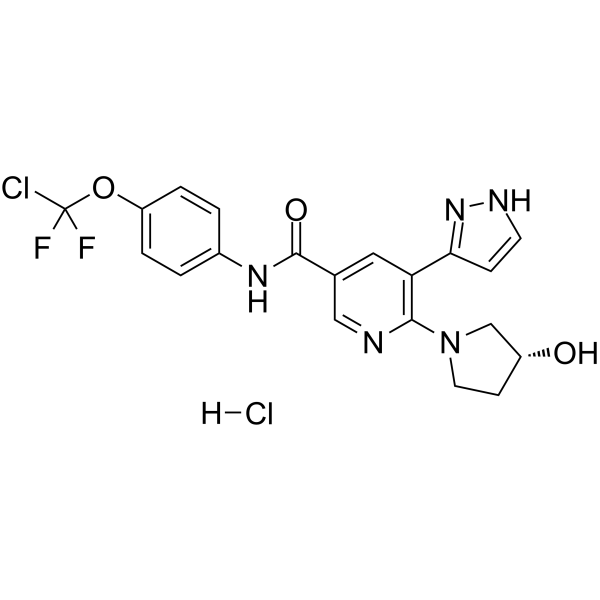2119669-71-3
| Name | Asciminib hydrochloride |
|---|
| Description | Asciminib (ABL001) hydrochloride is a potent and selective allosteric BCR-ABL1 inhibitor, which inhibits Ba/F3 cells grown with an IC50 of 0.25 nM[1]. |
|---|---|
| Related Catalog | |
| In Vitro | Asciminib (ABL001) hydrochloride binds to the myristoyl pocket of ABL1 and induces the formation of an inactive kinase conformation[1]. Asciminib hydrochloride binds potently (dissociation constant=0.5-0.8 nM) and selectively to the myristoyl pocket of ABL1 and induces the inactive C-terminal helix conformation. Asciminib hydrochloride exhibits the same non-ATP-competitive biochemical kinetics as the BCR–ABL inhibitor GNF-2 but with approximately 100-fold greater potency[1]. Asciminib hydrochloride lacks activity against more than 60 kinases, including SRC, and is similarly inactive against G-protein-coupled receptors, ion channels, nuclear receptors and transporters[1]. In BCR–ABL1-transformed Ba/F3 cells grown without IL-3, Asciminib hydrochloride has an anti-proliferative with IC50 value of 0.25 nM. In the CML blast-phase cell line KCL-22, Asciminib hydrochloride inhibits phosphorylation of both STAT5 (Tyr694; pSTAT5) and BCR–ABL1 (Tyr245; pBCR–ABL1) after 1 h using concentrations that correlate with those required for inhibition of cell proliferation[1]. Asciminib hydrochloride is selectively active against all BCR–ABL1 lines (IC50 value of 1–20 nM), irrespective of the presence of either the p210 or the p190 BCR–ABL1 isoform[1]. |
| In Vivo | Single doses of 7.5, 15 and 30 mg/kg Asciminib, administered to mice bearing KCL- 22 xenografts, inhibits pSTAT5 (Tyr694), which return to baseline at 10, 12 and 16-20 h after administration of the dose, respectively. In mice implanted with KCL-22 tumors, the minimum dose of Asciminib required for complete regression is 7.5 mg/kg twice a day (BID) or 30 mg/kg once a day (QD), and is tolerated at doses up to 250 mg/kg BID[1]. |
| References |
| Molecular Formula | C20H19Cl2F2N5O3 |
|---|---|
| Molecular Weight | 486.30 |
